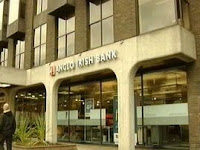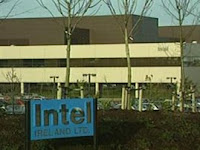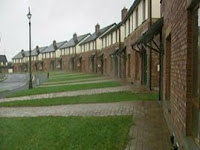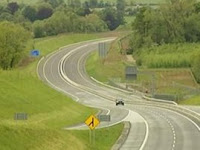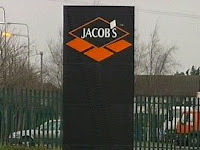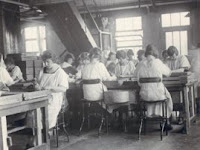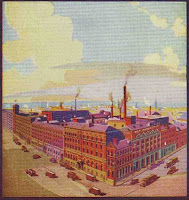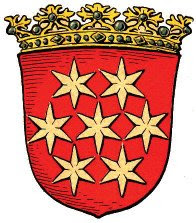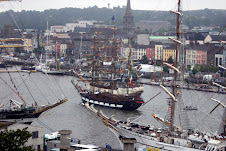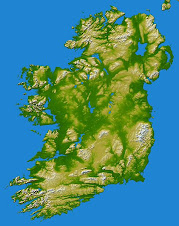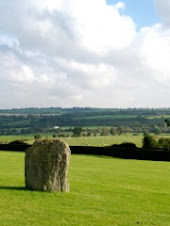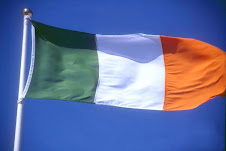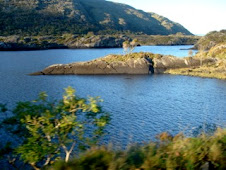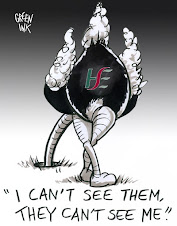As the day sets and the weekend approaches, Ireland is still in deep shock over the revelations of the report on long-time organised child abuse in Catholic institutions. This 3000-page document is the result of more than ten years of investigation, was compiled by a State Commission chaired by Judge Seán Ryan and published in Dublin on Wednesday.
(for details see yesterday's entry below)Many people are very angry, others say they "just feel numb" as they never expected that such things could happen, and certainly not in 'Holy Ireland', where priests and religious were put on pedestals for centuries and worshipped almost as much as God and Jesus Christ.
Perhaps this over-reverend, sycophantic and almost slavish attitude towards people in cassocks and habits was one of the contributing factors to the terrible crimes Irish priests and religious committed against Irish children for more than five decades. Anyone who is treated by others like a demi-god may after a while begin to believe that he actually
is a demi-god and behave accordingly. (And there are many examples for that in history.)
Or, as the famous Lord Acton wrote in the 19th century:
Power corrupts, and absolute power corrupts absolutely.The first 'industrial schools' for "neglected, orphaned and abandoned children" in Ireland were established by the British colonial administration in the second half of the 19th century under the
Industrial Schools Act of 1868. (A similar Act of Parliament was passed already for England in 1857.) The Act was intended to "solve problems of juvenile delinquency, by removing poor and neglected children from their home environment to a boarding school". It allowed magistrates to send "disorderly children" to a residential 'industrial school'.
A further Act of 1876 led to the establishment of non-residential day schools of a similar kind.
It is however worth to point out that the number of children sent to these special schools was not very large in the early years of their existence. Then the size and purpose of Ireland's 'industrial schools' was significantly increased, at the same time that
Fianna Fáil - which had until 1927 refused to sit in the
Dáil (because they were required to swear an oath of allegiance) or take part in normal parliamentary business - gained power in Ireland for the first time in
1932.
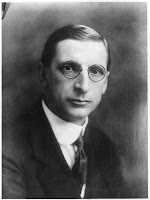
The party's founder and first leader
Eamon de Valera (photo) was not only a very pious and old-fashioned Catholic (in the Spanish tradition of his Cuban father) who contemplated at least for some time to become a priest himself, he was also a very strict and authoritarian man who demanded blind and uncritical loyalty from all his followers.
(Although the present party leader - Taoiseach Brian Cowen - is the seventh man in charge of Fianna Fáil, the party's demand for blind loyalty, regardless of facts and common sense, is still the same as under de Valera.)The year that saw
Fianna Fáil taking control of the 'Irish Free State' was a time of great upheaval in Spain, where the conflict between different social and political groups would eventually lead to the Spanish Civil War (1936-1939).
De Valera had Spanish as well as Irish roots, and during the first years of the (second) Spanish Republic, which had been established in April 1931, he and many other traditional Catholics all over Europe were very upset by the reports they received from Spain.
Representatives and supporters of the left-wing republican movement turned their anger not only against aristocrats and land owners, but also against Catholic priests and religious, who were seen by many (and with good reason) as backbones of the conservative and reactionary system that had ruled Spain for centuries and ruined her economy. Some Catholic clerics were killed by mobs, others were put on trial in courts and sentenced to death or imprisonment. A number of churches and monasteries were closed or confiscated, and in general life was hard and dangerous for anyone openly supporting the Catholic Church in Spain at that time.
During the 1930s Ireland was still a very young State without a solid base, strong economy or developed infrastructure. And the scars of the Irish Civil War, which ended in 1923, were only too visible everywhere. Old comrades had stood on opposite sides in this short, stupid and totally unnecessary conflict which literally pitched brother against brother and divided families for ever. There was also still a very large and poverty-stricken underclass in Ireland at the time, and who could say if these people might not behave in similar fashion as the poor working classes in Spain, if they got a chance to revolt against the authorities of State and Church.
Parallel to the events in Spain, Benito Mussolini was celebrating ten years of Fascist rule in Italy, and in Germany Adolf Hitler had increased his support so much that it was only a question of time when he would be in power, too. (He got there on January 30th, 1933.)
Unfortunately there has never been any deeper historical research into the personal and political motives of Eamon de Valera and his closest advisers in these early years. I hope that someone will undertake this work and provide us with more insights at some stage.
But for the time being one can only speculate about de Valera's thoughts and feelings during the first few years he was back in charge of the country. (He had been already the head of state and head of government of the unilaterally declared Irish Republic from 1919 to 1922, but resigned over the Anglo-Irish Treaty and stormed out of the
Dáil, followed by his supporters. This split led to the Irish Civil War, but even after hostilities had ceased, de Valera and his new political party
Fianna Fáil - founded in 1926 - remained refuseniks until 1927, when they decided to join the democratic system of the State.)
It is quite possible and more than likely that between
Eamon de Valera and the conservative Irish bishops a strategy was agreed to prevent any left-wing and anti-Catholic revolution in this country.
Every Catholic theologian is familiar with the famous words of Ignatius de Loyola (founder of the Jesuits), who said:
"Give me a boy of seven, and I will give you the man."And even though the Jesuits were never involved in the running of the 'industrial schools', their extensive use under the
Fianna Fáil government of Eamon de Valera was most likely inspired by Jesuit thinking and teaching.
The idea of having special schools for the poor (and not just for 'juvenile deliquents'), run and controlled by the Church, would have been very appealing to an authoritarian and conservative Catholic like de Valera. In these schools "the lesser skilled children from the lower classes" could learn a trade that would give them a chance of employment, and they would also receive strict religious instructions and conservative indoctrination to keep them "on the right side of the track".
The same kind of thinking is also evident in the new
Irish Constitution, which Eamon de Valera introduced in 1937, and in the new structure of
Seanad Éireann, which was re-organised by him according to different social groups in society, and thus along the lines of Catholic social theory of the time.
(see my entry of March 23rd)Neither Eamon de Valera, nor his close friend and spiritual adviser John Charles McQuaid, CSSp (who was later Archbishop of Dublin from 1940 to 1972), were particularly mercantile-minded. So it is unlikely that they saw the huge potential for making massive profits with the 'industrial schools'.
This only dawned on the religious orders after running them for a while on the new enlarged scale, and they then tried to expand the size of their institutions even further and thus maximise their profits as well.
Whatever one might think of Eamon de Valera, he was not a child molester and would certainly never have imagined that the institutions he wanted to use to stabilise the social structure and system of the State would become places of organised child abuse by priests and religious.
But - like anyone else who has held political office in Ireland between the 1930s and the 1980s -
Eamon de Valera carries a share of responsibility for the horrible crimes now revealed and documented. Not so much for increasing the use of the 'industrial schools', but more for the ignorance and disinterest he and his ministers displayed when they received complaints from the abuse victims, their parents and relatives, or even from some concerned civil servants of their own administration.
They simply did not care what happened to "brats from the lower classes". They could not even be bothered to have a good look at the institutions, to establish what conditions they - and their inmates - were in.
In the same era that saw Ireland's 'industrial schools' enlarged, the ordinary and 'law-abiding' people of Germany did and said nothing when they saw their Jewish neighbours rounded up by Police and SS. Jews were marched to the local railway station, put on a train and disappeared, never to be heard of again.
Research has established that most Germans did not know in detail what was actually done to them. But they all knew that their former neighbours were not going away on holidays, and not moving house in the normal way (as they were only allowed hand luggage and all their furniture and major possessions were left behind). Some may have guessed, others imagined the truth, as there was of course a massive Nazi propaganda campaign against Jews for many years. But even those who did not think much about Jews knew that they were forced to go, and that they would not come back. This did not bother them in any way, but it made them co-responsible for crimes against humanity.
The same attitude existed in Ireland, where everyone knew at least some of the sinister Catholic institutions, and knew that there was 'something wrong' with them. But no-one cared, bothered to have a closer look, or asked questions.
Which means that as a nation we are collectively guilty as well. People over the age of forty who lived in Ireland during those decades should ask themselves how much they knew, and what they might have been able to do, if they had been more courageous. All those who were in any kind of authority in Ireland participated and collaborated with the system of collective cruelty and neglect. They must now bear their share of responsibility for the horrible crimes Catholic perverts committed against three generations of our children.
Had
Fianna Fáil not joined the democratic system in 1927 and not won the general elections of 1932, would we have had such a large network of 'industrial schools' in Ireland, with so many thousands of children in them for half a century? Probably - or most likely - not.
And without the bleak institutions, we might not have had the widespread subculture of violence, sadism and child abuse. But then again, there was more than enough violence against children in normal day schools as well, and the brothers and sisters abused children also in orphanages, homes for the handicapped and all kinds of schools.
In my opinion the roots of the endemic physical and sexual abuse of children grew within the Catholic Church. The unnatural way of life that is forced upon priests and religious pushes many of them over the edge of normal behaviour.
Especially the demand of celibacy (for secular priests) and chastidy (for all religious) is a major problem and causes all kinds of frictions and conflicts of interest. As sexuality is one of the most natural things for any living creature, it makes neither sense to ban people from it, nor does it actually work. (For example, many Catholic priests in Brazil, the Philippines and other parts of the co-called 'Third World' have unofficial wives and children. This is no secret, and they live openly in their parishes as happy family men. The Vatican knows it as well and does officially not approve of it. But since the Church has increasing difficulties finding enough celebate priests, the Catholic hierarchy is closing their eyes on this matter, pretending not to know. It is the same attitude that made them ignore the crimes against Irish children for decades.)
The demand of celebacy has also led to an over-proportional amount of homosexual men being attracted into the Catholic priesthood. And as soon as they find out that their sexual orientation is shared by other priests or brothers, Nature does the rest. There are widespread homosexual networks within the Catholic priesthood, and there were even a number of seminaries in Ireland where the percentage of practising homosexuals - students as well as teachers - was between 80% and 90%. Some were quite discreet, while others made no secret of it and could be seen walking around Irish towns holding hands, or sitting in pubs, drinking and kissing.
Over the past ten years much of this 'camp' behaviour has disappeared from the 'public radar' and gone back underground, where it has existed for centuries.
And although
Pope Benedict XVI has meanwhile issued a brave decree, stating that he will no longer tolerate practising homosexuals in the priesthood, I have not heard of any resignations or sackings of priests. At least all of the homosexual Irish clerics I happen to know personally are still here, and still Catholic priests.
If the Catholic Church wants to survive as a world-wide institution, the rule of celebacy will have to go sooner or later. And as it is not one of the divine (or Biblical) laws, but a man-made rule introduced only in the 12th century, it should not cause any theological problem to remove it again. All it needs is the right Pope, and it will disappear over night.
As long as the Catholic Church demands an unnatural lifestyle from her priests and religious, there will be cases of sexual misbehaviour, paedophilia and child abuse among the clergy. And there have been known cases in almost every country in the world where there are Catholics.
What makes the Irish situation so different - and in fact unique - is the dimension. There is no other country - large or small - that has seen such an organised and systematic reign of terror with cruelty and child abuse, perpetrated by Catholic priests and religious, over more than half a century.
The reason is that since the 1930s Ireland's 'industrial schools' provided a unique environment for sadism, exploitation and child abuse on a colossal scale, which did not exist elsewhere. The bleak and deliberately unfriendly conditions of the institutions created plenty of tensions and distress, among the staff as well as among the children sent there.
Who on Earth would be happy living and working in hell holes with no culture and no decency?
Studies into the structure of the US Army have established that soldiers and officers posted for lengthy periods to bleak, inhospitable or boring stations often develop behavioural symptoms they did not show while serving in other commands. These symptoms include the development of strange hobbies, serious alcoholism, increased brutality, sadistic behaviour (towards animals as well as people) and sexual perversions.
It can be concluded that the same conditions applied to Catholic religious did produce the same behavioural symptoms in them as they have done in US military personnel.
So even though sexual misbehaviour is not unusual within the Catholic clergy world-wide, what happened in Ireland was a direct result of the unique environment of 'industrial schools' and other bleak institutions, enlarged to truly industrial dimensions by Eamon de Valera in order to subdue potential revolutionaries from the 'lower classes'.
Over the coming decades historians and psychologists will certainly look more closely at all the available documents, facts and details of this period. They will surely provide more answers than I can give here to the questions that are on almost everyone's mind in Ireland today: Why did this happen? And how could it happen for so long and on such a massive scale?
The Emerald Islander About 150,000 people from all over Ireland and from abroad have come to Galway for this long weekend to attend the city's two-week-long maritime festival, which is organised to celebrate the stop-over of the 2008/2009 Volvo Ocean Race (see my entry of May 24th).
About 150,000 people from all over Ireland and from abroad have come to Galway for this long weekend to attend the city's two-week-long maritime festival, which is organised to celebrate the stop-over of the 2008/2009 Volvo Ocean Race (see my entry of May 24th).




